Upkeep and Maintenance for UH 60 Helicopters
Upkeep and Maintenance for UH 60 Helicopters
Blog Article
The Impact of Sustainable Practices on the Future of Airplane Procedures and Emissions Reduction
As the aviation sector deals with increasing examination over its ecological effect, the adoption of sustainable methods arises as an important path toward future aircraft procedures and exhausts decrease. Developments in lasting aviation fuels and improvements in crossbreed propulsion innovations stand at the center of this transformation, promising considerable reductions in greenhouse gas exhausts. Nonetheless, the effective integration of these initiatives rests on a variety of variables, consisting of governing structures and market partnership. The question continues to be: just how will these evolving practices reshape the dynamics of flight and contribute to a more sustainable future?

Introduction of Sustainable Practices
Sustainable methods in airplane procedures include a variety of methods targeted at decreasing environmental effect while keeping functional efficiency. These methods are essential in the air travel industry's dedication to decreasing its carbon footprint and adhering to international ecological requirements. Trick efforts consist of optimizing flight paths to lower fuel consumption, enhancing maintenance procedures to make certain aircraft operate at peak effectiveness, and applying advanced modern technologies such as winglets and light-weight materials that enhance the rules of aerodynamics.

Engaging and training staff on sustainability methods additionally play a crucial duty, promoting a culture of ecological responsibility within organizations. On the whole, the combination of these sustainable techniques not only helps in reducing emissions yet also boosts the lasting practicality of the air travel field, ensuring it satisfies the demands of both consumers and regulative bodies while adding to global sustainability goals.
Ingenious Fuel Alternatives
Various cutting-edge gas alternatives are becoming pivotal remedies to reduce the aviation industry's reliance on conventional fossil gas. Among these alternatives, Sustainable Air travel Gas (SAFs) have gotten substantial focus due to their potential to decrease lifecycle greenhouse gas exhausts by approximately 80% contrasted to standard jet fuels. SAFs are stemmed from numerous feedstocks, consisting of waste oils, farming deposits, and even algae, making them a functional alternative for the sector.
An additional encouraging option is hydrogen gas, which, when made use of in gas cells, creates just water vapor as a byproduct. This zero-emission prospective presents a considerable chance for decarbonizing flight operations, particularly for short-haul trips and local airplane. Furthermore, electric propulsion systems are being explored, leveraging battery modern technology to power airplane. While current battery capacity limits array and payload, continuous improvements may soon provide electric flights feasible for particular applications - uh 60.
Lastly, biofuels stemmed from biomass are being explored, using a sustainable option that can be blended with standard fuels. Jointly, these innovative gas choices stand for a vital action toward attaining a sustainable aeronautics ecosystem, straightening with worldwide discharges decrease targets and enhancing the sector's environmental stewardship.
Technical Developments in Aviation

Exactly how can technical advancements improve the future of air travel? The assimilation of innovative innovations is crucial in changing aircraft procedures, enhancing effectiveness, and reducing discharges. Innovations such as hybrid and electric propulsion systems go to the forefront, promising considerable reductions in fuel usage and greenhouse gas exhausts. These systems leverage improvements in battery innovation and energy administration, making it possible for look at more info aircraft to operate with a lower ecological impact.
Moreover, the implementation of innovative materials, such as light-weight composites, adds to enhanced aerodynamics and fuel efficiency. Using synthetic intelligence and artificial intelligence in flight operations maximizes path preparation and decreases gas shed by enabling real-time modifications based upon weather and website traffic conditions. In addition, the growth of autonomous and remotely piloted aircraft systems stands to revolutionize freight and guest transportation, potentially enhancing efficiency while lessening human mistake.
Additionally, lasting air travel innovations, consisting of sophisticated air web traffic management systems, can simplify procedures and reduce blockage, bring about lower emissions throughout flight. These improvements collectively represent a standard change in air travel, promising a future where sustainability and functional efficiency are intertwined, consequently supporting the market's commitment to lowering its ecological effect.

Regulatory Structure and Compliance
Because of the growing emphasis on ecological stewardship within the aeronautics sector, the regulatory structure controling airplane operations is click here for more info advancing to promote sustainable practices. Governing bodies, such as the International Civil Aeronautics Company (ICAO) and numerous national aeronautics authorities, are presenting stringent standards targeted at lowering discharges and enhancing operational performance.
These laws usually consist of the fostering of Sustainable Air travel Fuel (SAF), which has actually been identified as a vital part in achieving reduced carbon impacts. Compliance with these regulations needs airlines to apply operational techniques and advanced technologies, such as maximized flight paths and enhanced air traffic administration, to lessen fuel consumption.
Furthermore, the enforcement of emissions trading plans and carbon balancing out efforts is coming to be progressively common, engaging airlines to keep an eye on and report their exhausts properly. Non-compliance can lead to substantial charges, therefore pushing operators to prioritize sustainability in their organization versions.
Ultimately, the developing regulatory landscape not just drives development and investment in eco-friendly innovations however additionally promotes a culture of liability within the aeronautics sector. As these structures remain to create, the concentrate on lasting techniques will be important to attaining the industry's lasting ecological goals.
Future Trends in Aircraft Operations
As the air travel sector adapts to an increasingly rigid regulatory setting, future trends in aircraft operations are readied to concentrate on cutting-edge options that further improve sustainability and effectiveness - uh 60. Key advancements will likely include the fostering of advanced air website traffic administration systems, which utilize real-time data and fabricated knowledge to optimize trip paths, minimizing fuel consumption and exhausts
One more significant trend is the raised combination of lasting more tips here air travel fuels (SAFs) These choices to conventional jet fuel, stemmed from eco-friendly resources, can substantially decrease lifecycle greenhouse gas emissions. The industry's dedication to SAFs will likely accelerate as airlines work together with gas producers to make sure availability and cost-effectiveness.
Additionally, the push towards electrification and crossbreed propulsion systems is obtaining momentum. Arising aircraft styles will include these modern technologies, offering quieter and extra efficient procedures, specifically for short-haul flights.
Final Thought
The adoption of sustainable air travel gas, coupled with improvements in hybrid and electric propulsion systems, is vital for reducing lifecycle greenhouse gas exhausts. Maximizing trip paths and welcoming ingenious technologies contribute to a quieter and extra environmentally friendly air travel market.
Innovations in sustainable air travel gas and improvements in hybrid propulsion modern technologies stand at the forefront of this makeover, promising considerable decreases in greenhouse gas emissions.Countless ingenious fuel options are emerging as essential services to lower the aviation sector's dependence on conventional fossil gas - uh 60. Among these choices, Sustainable Air travel Gas (SAFs) have actually acquired substantial focus due to their possible to lower lifecycle greenhouse gas emissions by up to 80% compared to traditional jet fuels.Another significant fad is the increased assimilation of lasting aviation fuels (SAFs) The fostering of lasting aviation fuels, combined with improvements in hybrid and electric propulsion systems, is necessary for decreasing lifecycle greenhouse gas emissions
Report this page